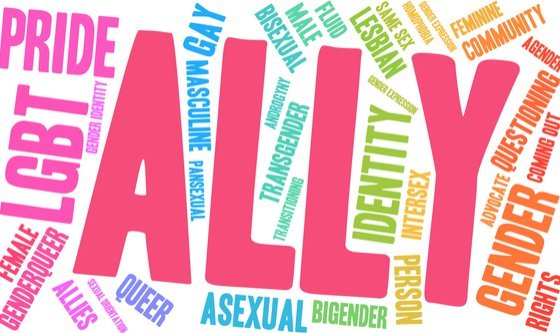
How to be an LGBTQ-ally
How do you have sex? Who’s the man and the woman in the relationship? When did you figure out you were gay?
These are some of the questions many ‘baby allies’ are burning to ask and, much as they are interesting, they aren’t always helpful. Being an ally can sometimes be tricky: knowing when to not cross a boundary, when to shut up, and when to step up can take time to learn.
‘Ally’ is a term used to describe someone who is supportive of LGBTQ people. This includes non-LGBTQ allies as well as those within the LGBTQ community who support each other, e.g. a lesbian who is an ally to the bisexual community.
The key term here is ‘support’.
How can you be an ally and support?
Understand that their entire life is not their sexuality
When people come out to others, often their entire identity starts to rotate around them being queer. Although this is an important aspect of their lives, it is not their entire life. They are still everything you knew them to be/everything they are. Someone doesn’t stop being a doctor/writer/dope dancer just because they are gay. It is important to engage with all facets of a person’s life.
Just think about yourself: who you are attracted to doesn’t affect how you treat your parents or how well you did in school.
Be honest about your limits
Knowing queer people doesn’t make you an expert.
Watching some shows where about gay lives and following woke queer people on social media does not a master of knowledge make.
Often people are quick to think they know about/can speak on queer peoples’ behalf and get it so wrong, whilst not engaging with their own prejudices and biases.
Be open to learning about the unique and diverse experiences that make up the lives of queer people, especially those of people on the continent. This will often vary from country to country, from context to context. It will certainly be different from what is depicted in Western shows to quite a large extent.Listen
This is probably the most important point. When, as a queer person, one discusses sexuality or LGBTIQ issues, one of the key things is to be seen and heard. Be it coming out to another person (or even dealing with sexuality themselves) or discussing issues focused it is important to centre their experience.
As an ally, the first instinct will be to jump in and ask a whole bunch of questions (some of which can be intrusive) or make observations. However, listening to what they want and need to tell you should be top of your priority. Queer people are the ones ‘in the know’, so it is often best to let them lead the conversation about queer things. Take your conversational cues from them.Also, those who listen learn more.
Be supportive
Although you may feel that saying things such as ‘I know one other gay person! Should I hook you up?’, ‘I love Janelle Monae so much more after she came out as queer’ or ‘I would totally hook up with a girl’ is a show of support but often it is not.
If you are to be an effective ally, meet the queer person where they are at because being part of the LGBTIQ community is not simply partying, trying to find sex or pop culture references. There is so much more to engage with, as is the same with all lives, so show support for all of it. Find out about the intricacies of a person’s life, be it the activism they are passionate about, the personal issues they face or if they are interested in being ‘a super gay’.Do your own research
Sometimes, the questions can get a little bit much, and although you want to find out everything from your friend/loved one/family member, it might be best to also use the blessing that is Google. Sometimes reading various sites that look at the queer experience gives a broader view, more information and also a starting point to have conversations.
Don’t be nosy about their sex life
Queer sex can seem strange and exciting and now having a queer person in your life can make you think you now have a sexy kinky Wikipedia at your fingertips. It is okay to speak about sex. It’s not okay to dissect someone’s sex life because it is ‘fascinating’ or ‘bizarre’. Chatting about coitus over some wine in a social setting where everybody is sharing and learning is fine but do not make someone a spectacle because they have sex that is different to yours.
But on that note: it’s okay to get tips.Don’t use their queerness for your entertainment
Some people often mistake being an ally as shouting ‘yaaaaaaaaaaassssssss queen’ at gay men and offering to make out with lesbian women. It’s not simply about having a fashion-forward friend or someone to give you tips on eating vagina right. Always remember that your queer friend/loved one is not a prop to add to your ‘woke’ starter kit but a whole human living a life that is not there simply to give your life a dash of glitter.
Also, being an ally does not allow for homophobic/problematic jokes.Being an ally is a constant process of learning, but this is the first step – often the most important one. But also remember you do not get a cookie for being an ally, yet it is really the decent thing to do.
Do you have questions about being an LGBTQ-ally? Head to our forum and get your answers there.
